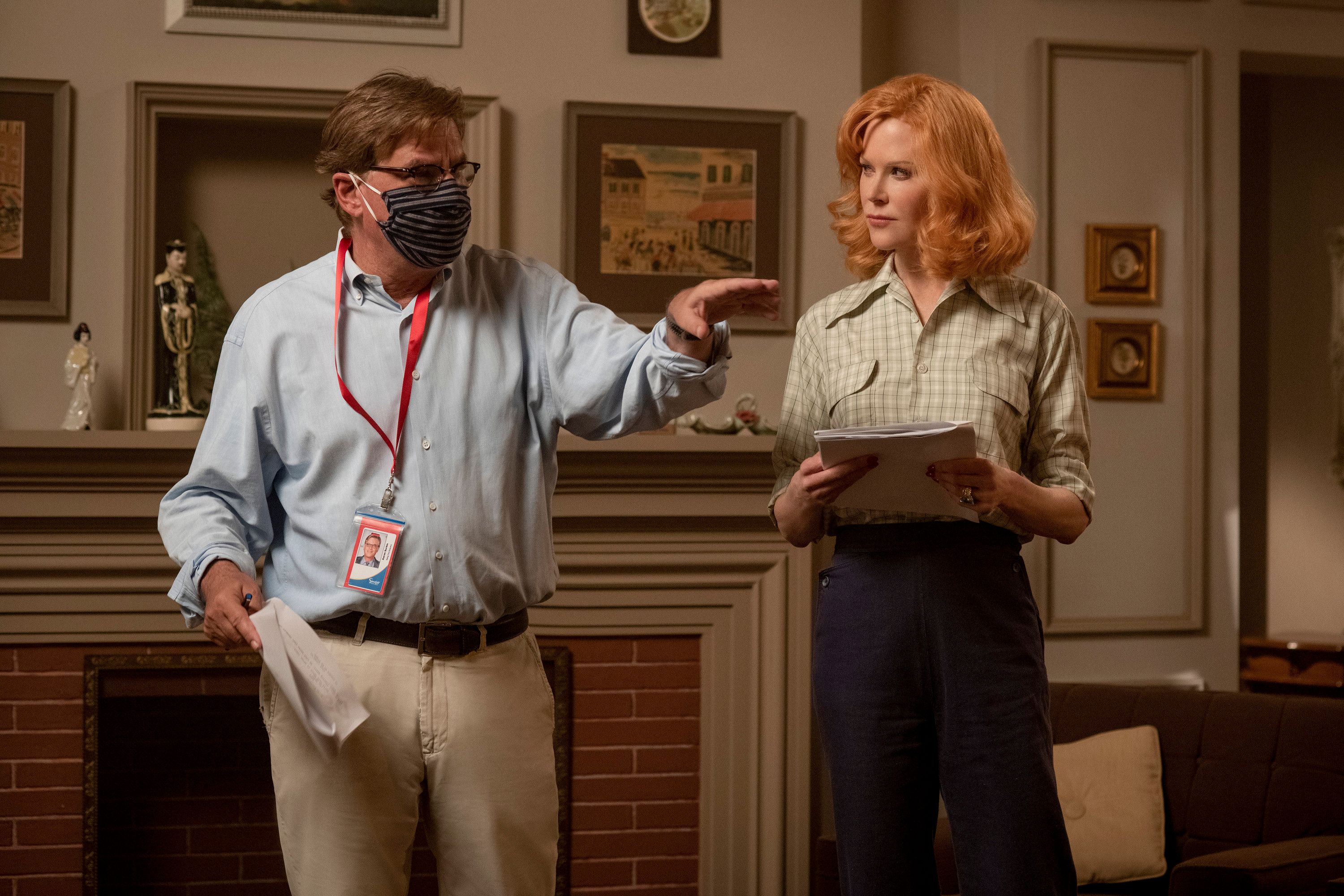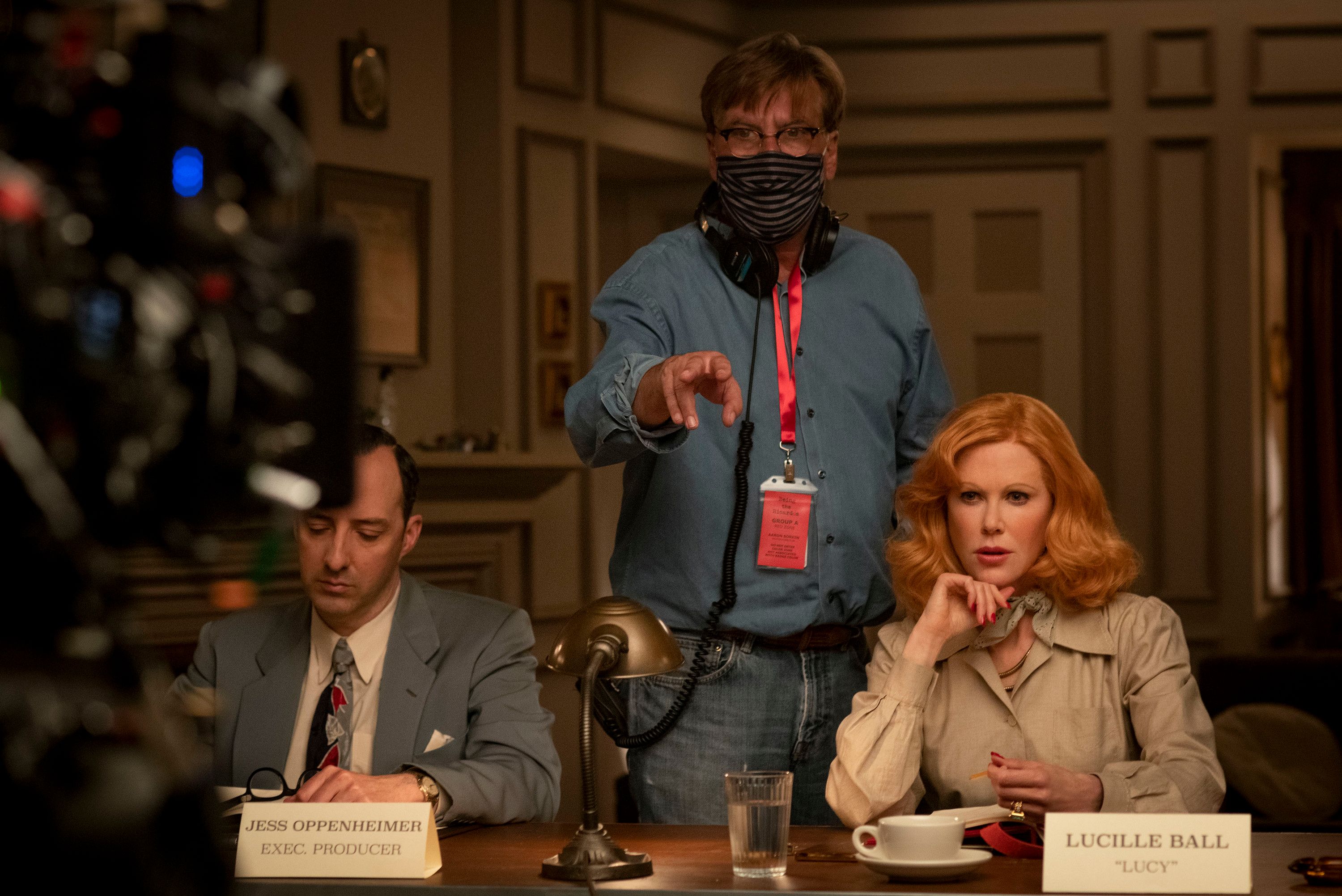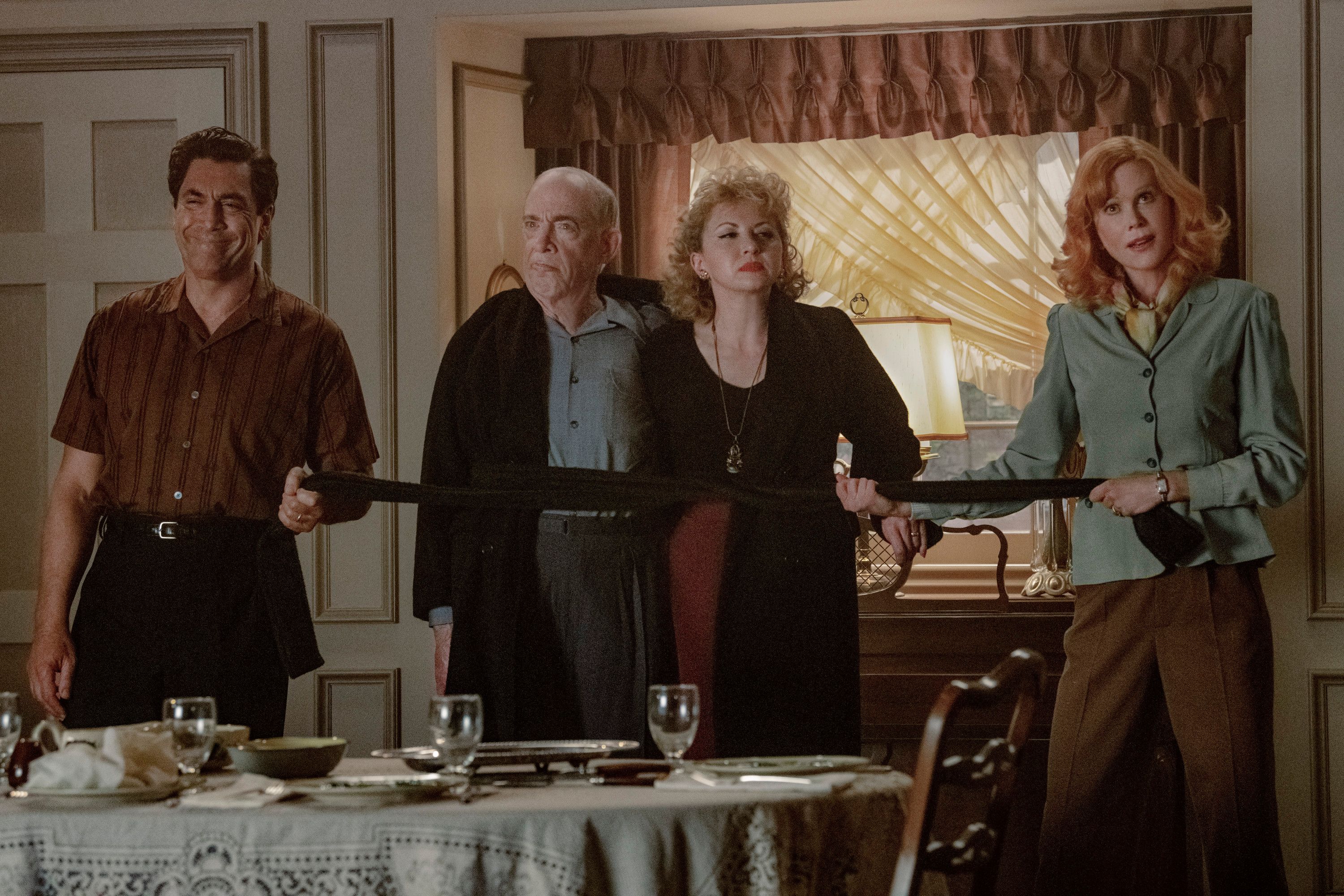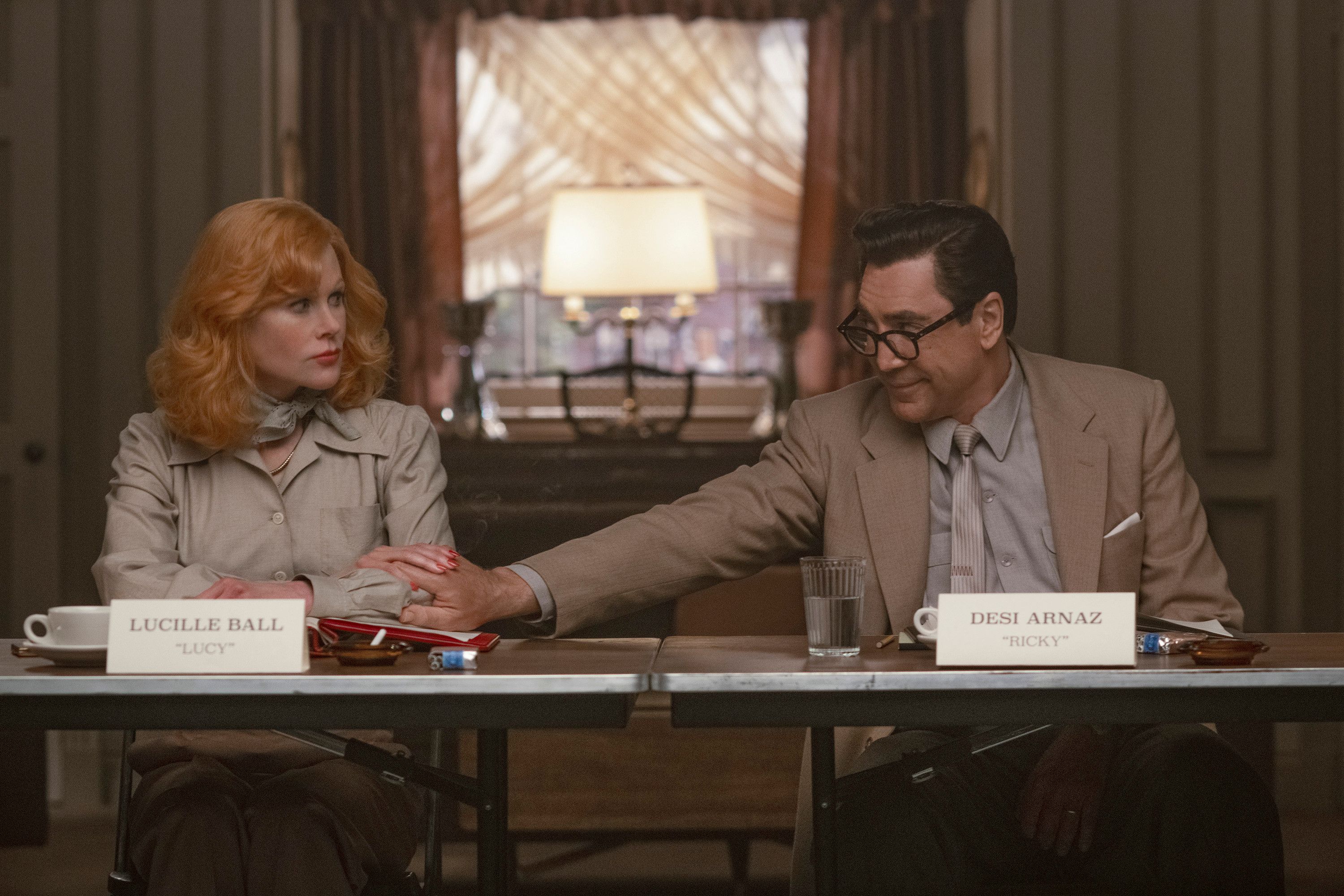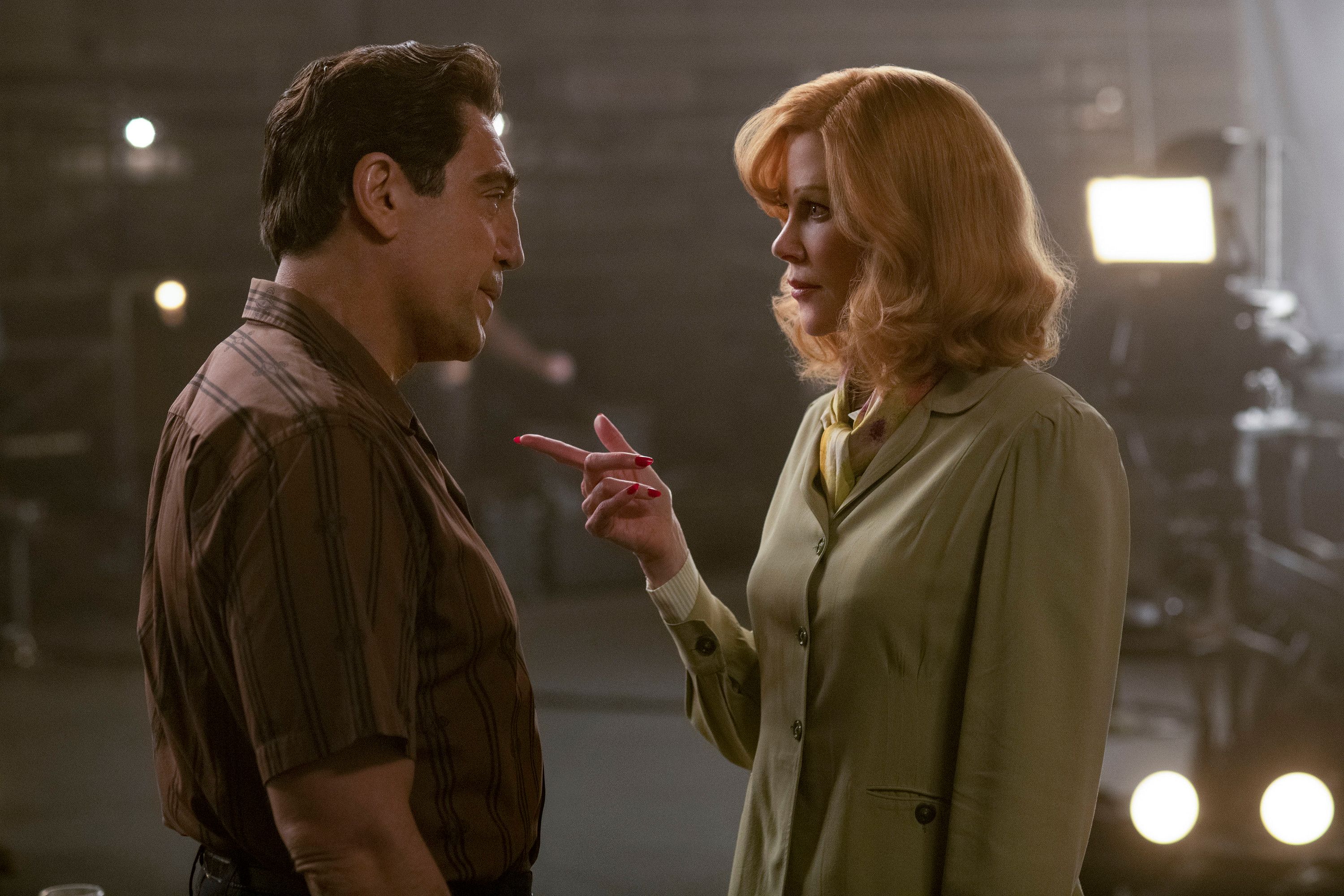With Being the Ricardos now playing in select theaters and streaming on Prime Video, I recently got to speak with writer-director Aaron Sorkin about making his latest film. As a huge fan of his work, I went in with a million questions, and thankfully, he was game to talk about everything. Since I had fifteen minutes, I started out asking about what happened with his Houdini musical that he was set to do with Danny Elfman, how he got involved working with Warren Beatty on Ocean of Storms, and then asked his thoughts on doing a Social Network sequel dealing with what’s happened since the first film came out.
However, the main reason I got to speak with him was for Being the Ricardos, and we spent plenty of time talking about how he figured out the story, how he made the film in 38 days, how long it took him to bring up Total Recall or Robocop when Ronny Cox was on set, how he decided to use the flash-forwards in the movie, how he figures out a solution when he’s stuck on something, and more.
If you haven’t seen the trailers, Being the Ricardos dramatizes an intense week for Lucille and Desi as they enter production on an episode of their hit sitcom I Love Lucy in 1952 — from the table read to the taping — while off-screen drama threatens to engulf their personal lives.
Since this is Aaron Sorkin, I’m offering the interview two ways: you can either watch what he had to say in the player above or you can read the transcript below. Being the Ricardos is now playing on Prime Video and it’s definitely worth your time, especially if you’re an I Love Lucy fan.
COLLIDER: If someone has actually never seen anything that you've done, what is the first thing you want them watching and why?
AARON SORKIN: That's an interesting question. I think it would depend who the person is, how old they are, that kind of thing.
I can tell you when I meet somebody who hasn't seen The West Wing, but wants to start watching The West Wing, I'll ask them to start with the second season because it took the first season for me to figure out how to write the show. If they want to see a movie I've written, it becomes a little trickier. That's a good question. Like I said, I think my answer is, it depends on who's asking.
You obviously are on a level where if you said, "I want to make this movie," I would imagine a lot of people might express interest. I ask this question of a lot of people, and I'm not sure what your answer's going to be. If you could get the financing to make literally anything you want to make, what would you make and why?
SORKIN: Listen, as we sit here, for the first time in a long time, I don't know what I'm writing next. I don't have an idea for whatever is going to be next. So I don't have a passion project that's been in my pocket all these years that I've wanted made. So I'll have to let you know when I get an idea.
Whatever ended up happening to that Houdini project, the musical that you were going to do with Danny Elfman?
SORKIN: Danny Elfman turned into Steven Schwartz. So I started working with, with Steven Schwartz. I was so excited about out that. And it was a complicated project, and basically, Steven and I couldn't find a place to connect on the page. I was writing something from different from what he was writing, and we just couldn't make it work.
Same sort of thing, but Ocean of Storms that you worked on with Warren Beatty, which I don't know if you want to talk about.
SORKIN: Yeah, it's the movie Warren and I have been making for close to 30 years. I was a punk kid out here to adapt my play, A Few Good Men, into the movie, A Few Good Men. And he had seen it and he was impressed with it. I was invited to a dinner at his house, this would've been in 1991, and was terrified. It was Warren Beatty and the kind of people who hang out with Warren Betty. I just happened to mention something. I think it was the first time I was speaking up all night.
I happened to mention something about the moon and space and NASA and my interest in it. He took me aside, and he said, "Did you say that on purpose? Did you say that because you know that I have this project?"
Honestly, I didn't know what he was talking about. What he had was an old script called Ocean of Storms, where there was one scene in it that he liked. He felt that the rest didn't work, and he wanted to start over. So I can't tell you how many sandwiches at a deli, Warren and I have had about Ocean of Storms. I'll always love it because it was the thing that started this three-decade friendship with this giant.
So the script's done, or is it not done?
SORKIN: No. No, no. It was never started.
I want to drill down on this so bad, but I got to move on. Obviously, I think we might have spoken for The Social Network many years ago. The fact is that's a masterpiece. It's a brilliant-
SORKIN: Oh, thanks so much.
... piece of writing. I mean, everything about that movie is phenomenal. In the last 11 years, Facebook has morphed into something completely different. We all know what I'm getting at. Have you and David Fincher actually talked about in a serious way, continuing the story, 10 years later, and looking at the ramifications of what has happened?
SORKIN: Well, it's something I've thought about a lot, and I've mentioned it to David. I think I'll leave it there. I don't want to make any news with regard to a Social Network follow up except to agree with you that there's more story.
Absolutely. And I would love it for it to be you and David to tell it.
SORKIN: I'd love nothing more.
So moving into why I actually get to talk to you. I really want to start with a sincere congratulations on the film. I think one of the smart things is the way that you took these real true events and just happened to have them all happen over one week.
SORKIN: I love compressing time and space. I love that claustrophobic, almost play-like feeling. So there were these three things that happened, these three big events in their life, the accusation that Lucy was a communist, the fact that Lucy was pregnant at a time when a woman could not possibly be pregnant on television. And the third was Desi showing up on the cover of Confidential Magazine, a gossip rag, with another woman, and the headline, "Desi's wild night out."
I thought, "Well, I'm not perverting history, or defaming these people, if I take those three events and make them happen during one week, compress time, and have the whole thing take place during one production week of, I Love Lucy, Monday table read to Friday audience taping." So that's what I did. Dramatists get to do that.
I'm fascinated by the editing process because it's ultimately where it all comes together. This is now your third film that you've directed. What have you learned as you've been progressing in the editing room that perhaps... Because it's a different beast than writing.
SORKIN: It is. The first thing I'll talk about is Alan Baumgarten, who's edited all three film that I've directed. And he is fantastic.
I love the editing process. Even before I started directing as the executive producer, the showrunner on the television that I did, there would be a director's cut. Then there would be a Tommy Schlamme cut after that. And finally, it would get to me.
By the time it got to me, it was in very good shape. So there wasn't a lot to do, but I still loved sitting with the editor and saying, "Let's shave four frames off that and get to the line faster. Let's use the two-shot here." That kind of thing. So I really do love the editing process.
With this film in particular, did you have a much longer first cut?
SORKIN: No, not much longer. There's one line that is on the cutting room floor. I can't think of anything else that was cut from the film. So it got shorter with tightening. I think probably the first cut was 11 minutes longer than our final cut, but it was just taking air out of scenes.
You made this film, I believe in 38 days, which is not a lot of time to make any film, let alone this kind of a film.
SORKIN: Let alone during COVID.
All of that. Was there any point during the shoot that you're like, "I don't know if we're going to be able to pull this off in the timeframe we have."?
SORKIN: There wasn't. I would say before the shoot, I was thinking, "38 days, how can we possibly do this in 38 days?" But another person who's been with me on all three films is Stuart Besser, our line producer. He's the one responsible for the schedule.
Not only didn't I ever feel pressured, time pressure, during that time, I felt other kinds of pressure. Not only didn't I feel time pressure, but there were some days that almost felt luxurious. Like, "Wow, we can take our time here. We can rehearse longer. Maybe I can send the crew home an hour early." I credit Stuart and a great crew.
I would imagine that all the actors that you brought in ... If these actors and everyone are working for you, I think everyone's bringing their A game. You know what I mean?
SORKIN: Yes, they are. I think these actors bring their A game no matter who they're working with. That is a big part of it. When the actors come to work, ready to work, and they're not learning the scene in the makeup trailer, then it makes the days a lot better. You're getting good stuff by the second take.
I also loved the flash-forwards. And the fact that you have Ronny Cox in the movie is like A plus casting. I really do want to know how long did it take you when you're working with Ronny to bring up Total Recall or Robocop?
SORKIN: I can tell you that it took the crew a matter of seconds to bring up Total Recall.
I would spend my entire day being like Chris Farley, "So you remember you were in that movie?"
SORKIN: Yeah. And I am that way with a lot of actors, including Ronny.
But getting into actually the flash-forwards. How did you craft that idea of putting the flash-forwards in the movie?
SORKIN: I needed a way to tell the audience right off the bat, that I Love Lucy was simply a different animal from every television show we're familiar with today, in terms of its popularity, of 60 million people watching the show, of department stores changing the night that they were open late because of the show, of a measurable drop in the amount of water being used during the show, because no one was going to the bathroom, no one was cooking anything in the kitchen.
And I needed a way to convey that. So, I thought of this idea. Once you do that, you can't just do it once and leave it alone. It'll become an exposition machine. So I needed to thread them throughout the film and have them kind of join up with the story at the very end.
The thing about this is that I never thought of the line, "Honey, I'm home," in the way that I now think about it after seeing this movie. So could you sort of talk about... Although I'm not 100% sure that line is in the show... because I heard this rumor...
SORKIN: You heard a rumor that he never said it?
Yes. Javier was saying that, and I'm like, "I don't know if that's true."
SORKIN: No, no, no. In the first season alone, Desi says, "Lucy, I'm home," 17 times.
So I'm not crazy.
SORKIN: People confused that with, "Lucy, you got some explaining to do," which Desi never said on the show. I'm not sure how it became its era's version of a meme, but it did. But, "Lucy, I'm home."
I was driving in my car, which is also what I do during the climbing the walls agonizing period. I try to find a straight piece of road, a freeway where I'm not going to have to think about turning. I try to start arguments with myself to see if I can get a scene going. What happened was...and just to set this up, we've got Lucy who yearns for domesticity. And it just occurred to me, the most iconic line from the show is, "Lucy, I'm home."
I can load that up. I can emphasize home in the story. I can write a speech that happens on the soundstage at 2:00 AM with Bill and Vivian, where she talks about it being like a fairytale you tell a little girl, where a witch casts a spell, that she'll be adored by the man she loves as long as she stays on this patch of ground. She talks about how she did I Love Lucy to save her marriage. She thought, "The construction department, they'll build us this little apartment, and that's where we'll live."
I'm driving in my car, thinking about all this. The very same smile that Lucy gets on her face of the irony, just literally stopping her in her tracks in front of an audience, of Desi, walking in the door and saying, "Lucy, I'm home." I got that smile on my face. I knew what the end of the movie was going to be. And once you have that, you can write toward it.
On that note, I'm out of time. I really hope at some point in the future, I get to have a longer conversation with you.
SORKIN: I hope so too. Thanks a lot for this one.
I really appreciate it. Thank you so much.


